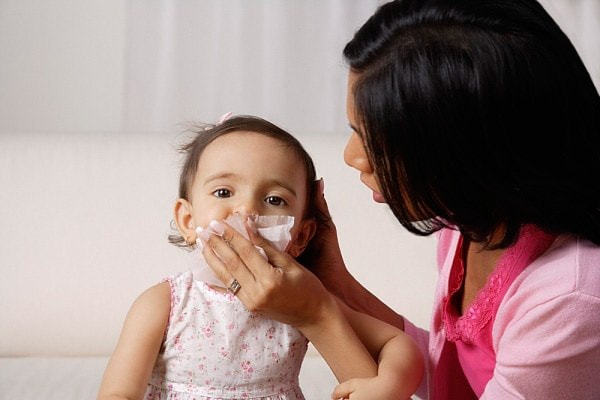Prevent respiratory diseases for children when the weather turns cold
Washing hands with soap is a very familiar saying but many parents forget or do not pay attention.
It's cold, babies are susceptible to illness.
A few days ago, seeing that the weather was getting cold, before taking her 3-year-old daughter Mi to daycare, Ms. Thanh Huyen (District 3, Ho Chi Minh City) prepared clothes for her little princess very carefully, but that same afternoon, she was worried when she saw that her daughter had symptoms of coughing and a runny nose.
When she got home, her best friend called to remind her to be careful to keep her child warm because several of her neighbors had children who had to be hospitalized for respiratory infections, caused by the change in weather.
Unlike the case of Huyen's baby Mi, Tuyet Mai (Nui Truc, Hanoi) had to take her baby to the hospital with a fever, severe cough, and wheezing. There, the doctors diagnosed the baby with acute respiratory infection.
Polluted environment or sudden weather changes make children susceptible to respiratory diseases.
Children's illness not only affects their health and learning opportunities, but also affects the health and work of parents because they have to spend a lot of time and mind taking care of their sick children.
When the weather starts to get cold, children under 5 years old often suffer from respiratory diseases because their resistance is weak, their bodies are sensitive to even small changes in the weather, and they are easily attacked by viruses and bacteria.

Early signs of respiratory infections
Cough may be accompanied by runny nose, sneezing, fever,... (Illustration photo)
In addition, because children are too young, they do not have the awareness to maintain hygiene and protect themselves from the risk of infection from the living environment (especially in kindergartens) and sick people, so they are more susceptible to disease. Therefore, the role of parents in preventing disease for their children plays a very important role.
The initial signs of respiratory infections are cough, possibly accompanied by a runny nose, sneezing, fever, etc. The baby may even have difficulty breathing or wheezing...
One thing parents need to keep in mind is that when children at this age get sick, the disease progression is often very fast and unpredictable... Therefore, if these diseases are not detected and treated promptly and properly, dangerous complications will occur such as acute respiratory failure, pneumonia...
So how to prevent the disease?
To prevent the above mentioned respiratory infections, Dr. Philippe Collin (Pediatrics Department, Vietnam - France Hospital) gives some advice to mothers as follows:
Mothers need to take better care of their children in the face of changing weather conditions. Children should be kept warm when it gets cold. Do not let children play in the cold or stay out too late; bathe children in warm water.
Parents need to pay special attention to strengthening their children's natural immunity through nutrition. Parents need to supplement their children with some familiar substances such as iron, zinc, DHA, omega 3, etc. in bread, some types of mushrooms, cereals, etc. Nutrition intake is a basic factor to create an immune barrier, helping to protect children from infection. Children need to be fully supplemented with vitamins and minerals to grow and develop as well as build a healthy immune system.
Dr. Collin believes that one way to strengthen your child's immune system is to let them sleep at least 8 hours a night.
Washing hands with soap is a very familiar saying, but many parents forget or do not pay attention. Washing hands helps prevent bacteria from entering the body, thereby supporting the child's immune system better.
When parents see their child has symptoms of high fever, severe cough, rapid breathing or difficulty breathing, refusal to eat or drink, or crying a lot, these are signs of serious illness and it is necessary to take the child to the hospital for examination and treatment.
Sick children often have difficulty eating and are prone to vomiting. Parents should feed their children light, easily digestible foods in several meals a day, but still ensure adequate energy.
Another important disease prevention measure is to fully vaccinate children according to the health sector's expanded immunization program.
According to Tri Thuc Tre - nt






